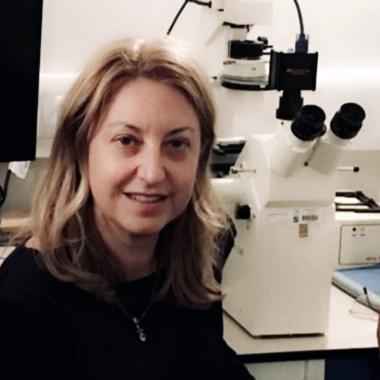- Cancer Mechanisms and Biomarkers
- Research Centre for Optimal Health
About me
I am a Professor in the School of Life Sciences, College of Liberal Arts and Sciences. I was educated in Italy and hold a PhD in Evolutionary Biology (Genetics and Molecular Biology) from the University of Rome ‘La Sapienza’. Before joining Westminster, I worked as a Post-Doctoral Research Fellow at Cancer Research UK. I was subsequently appointed Head of Molecular Cytogenetics and Microscopy at the Wellcome Trust Centre for Human Genetics, Nuffield Department of Medicine (University of Oxford). My teaching and research expertise is in medical molecular genetics, specifically focusing on genome functional organisation, chromosomal fragility and instability, nuclear architecture and dynamics, and cancer biomarkers. My current research at Westminster is multidisciplinary and focuses on understanding the risks to human health in light of genome-environment interactions. Throughout my scientific career, I have published extensively in international, peer-reviewed journals, including high-profile academic outlets such as Science and Nature Communications. As the former PhD Coordinator for the School of Life Sciences and College of Liberal Arts and Sciences and acting Deputy Director of the Graduate School, and PhD supervisor and examiner, I have considerable experience in postgraduate research supervision and mentoring of early career researchers. My advisory roles include the Scientific Programme Committee of the European Cytogenomics Conference and Chair of the ‘Chromosome Stability, Integrity and Dynamics’ permanent working group of the European Cytogeneticists Association. I also have extensive editorial experience and was recently appointed by Springer Nature as Editor in Chief of Molecular Cytogenetics. I am the Genetics Society UK Ambassador at Westminster, a Member of the British Society for Genetic Medicine, a member of the UK Environmental Mutagenesis Society, a Fellow of the Royal Society of Biology and a Fellow of the Higher Education Academy.
Teaching
I contribute to teaching across different modules, levels and courses in the Life Sciences. I am the Module Leader for L5 Genetics in Medicine, and L7 Post-Graduate Project. I am also Deputy Module Leader for L5 Medical Genetics and Genomics, and L7 Principles of Molecular Medicine. My teaching practice covers genetics, cancer biology, precision medicine and research methods. I am co-Course Leader for the Master Course in Biomedical Sciences.
Research
Genome health - defined as genome structural integrity and stability - is crucial for cellular and organismic fitness. My research applies molecular biology techniques and modern microscopy techniques for the assessment and monitoring of genome health from a chromosomal and nuclear architecture perspective, with the main aims of (1) understanding the requirements for genome health maintenance in vitro and in vivo, and (2) identifying pre-pathological biomarkers with translational potential.
Publications
For details of all my research outputs, visit my WestminsterResearch profile.
